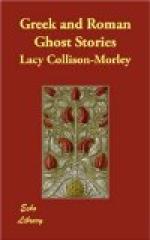[Footnote 56: Philostr., Apoll. Tyan., 4. 16.]
[Footnote 57: Tusc. Disp., 1. 16.]
[Footnote 58: Leg., x. 909B.]
[Footnote 59: Alc., 1128.]
[Footnote 60: De Div., 1. 58.]
[Footnote 61: Tusc., 1. 48.]
[Footnote 62: Pliny, N.H., 7. 52, 178.]
[Footnote 63: Myers, Human Personality, ii. 328, 329.]
[Footnote 64: Pharsal., vi. ad fin.]
[Footnote 65: Theb., 4. 405 ff.]
[Footnote 66: Met., ii. 28.]
[Footnote 67: In Vat., 6.]
[Footnote 68: An., ii. 28.]
[Footnote 69: N.H., 30. 5.]
[Footnote 70: Suet., Nero, 34.]
[Footnote 71: N.H., 30. 5]
[Footnote 72: Dio Cassius, 77. 15.]
[Footnote 73: Apollon. Tyan., 4. 16.]
V
VISIONS OF THE DEAD IN SLEEP
In most of the Greek and Roman stories that survive, the wraiths of the dead are represented as revisiting their friends on earth in sleep. These instances I have not, as a rule, troubled to collect, for they cannot strictly be classed as ghost stories; but since the influence of the dead was generally considered to be exercised in this way, I shall give a few stories which seem particularly striking. That it was widely believed that the dead could return at night to those whom they loved is proved by the touching inscription in which a wife begs that her husband may sometimes be allowed to revisit her in sleep, and that she may soon join him.
The most interesting passage that has come down to us, dealing with the whole question of the power of the dead to appear to those whom they love in dreams, is undoubtedly Quintilian’s Tenth Declamation. The fact that the greatest teacher of rhetoric of his day actually chose it as a subject for one of his model speeches shows how important a part it must have played in the feelings of educated Romans of the time. The story is as follows.
A mother was plunged in grief at the loss of her favourite son, when, on the night of the funeral, which had been long delayed at her earnest request, the boy appeared to her in a vision, and remained with her all night, kissing her and fondling her as if he were alive. He did not leave her till daybreak. “All that survives of a son,” says Quintilian, “will remain in close communion with his mother when he dies.” In her unselfishness, she begs her son not to withhold the comfort which he has brought to her from his father. But the father, when he hears the story, does not at all relish the idea of a visit from his son’s ghost, and is, in fact, terrified at the prospect. He says nothing to the mother, who had moved the gods of the world above no less than those of the world below by the




